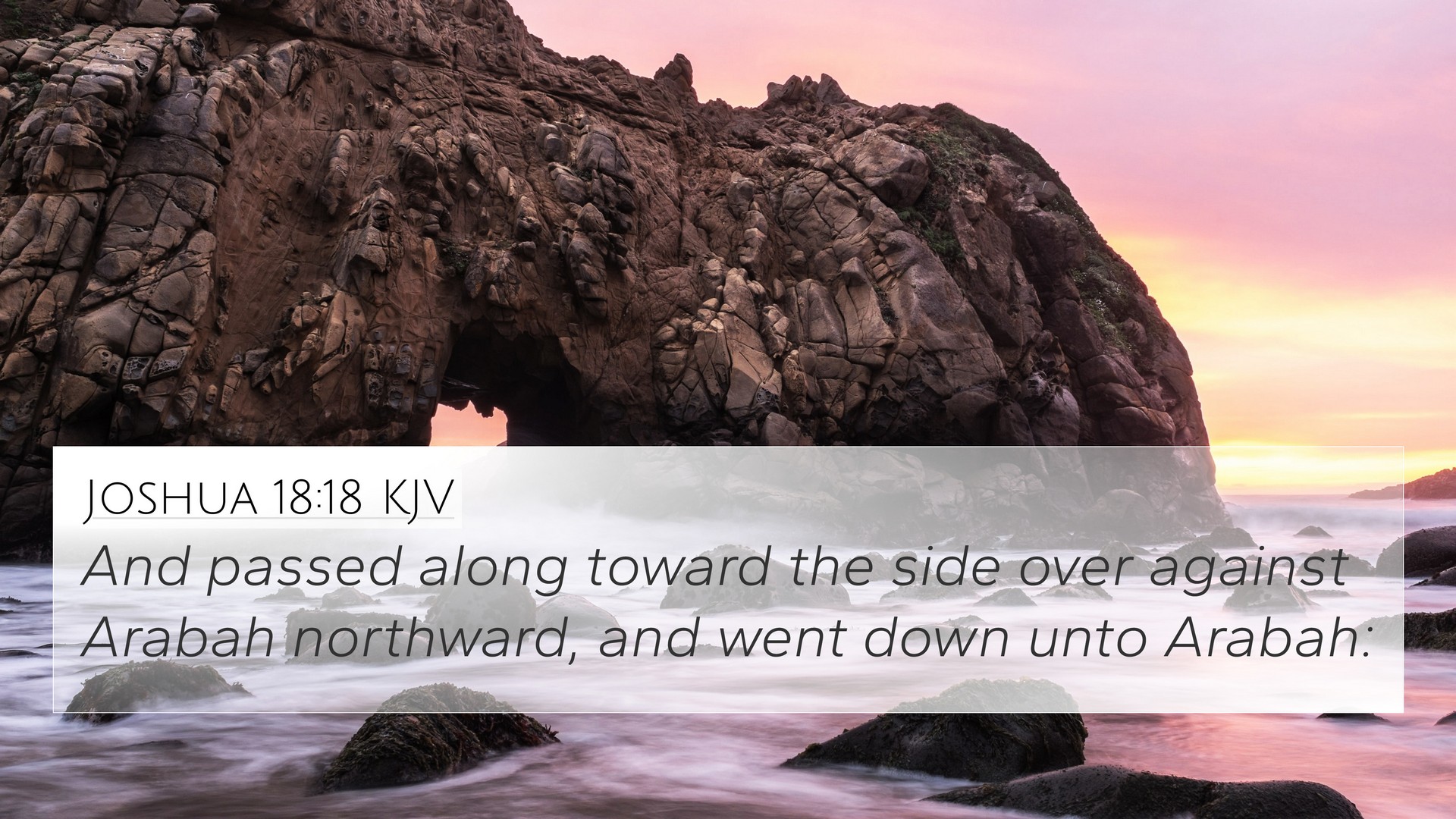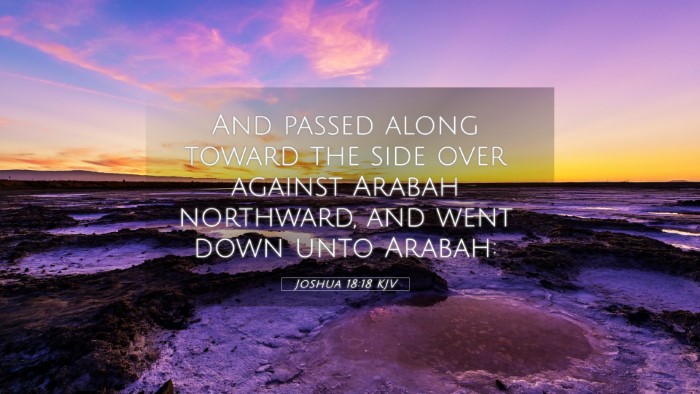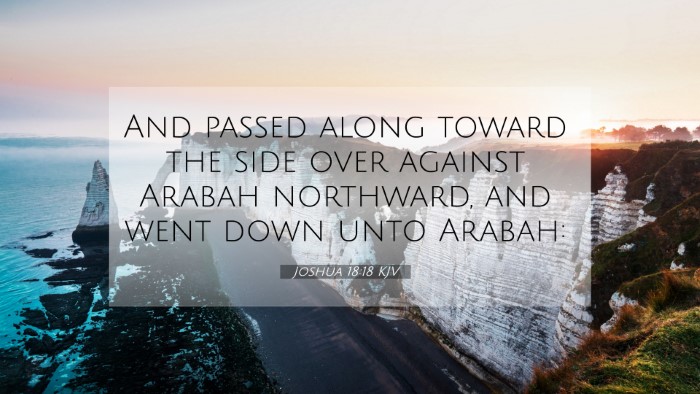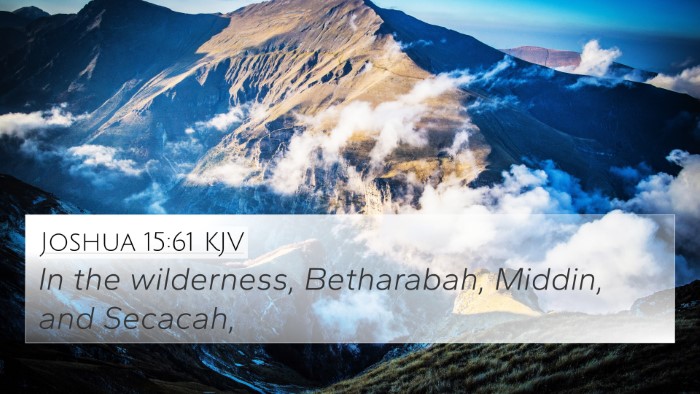Meaning and Interpretation of Joshua 18:18
This verse comes from the book of Joshua, which outlines the allocation of the Promised Land to the tribes of Israel after their exodus from Egypt and wandering in the wilderness. Joshua 18:18 states:
"And it passed along toward the north side of the Jebusite; the same is Jerusalem: and the border went up to the top of the mountain that lies before the valley of Hinnom westward, which is at the end of the valley of Rephaim northward."
This passage plays a critical role in establishing the geographical boundaries that were given to the various tribes of Israel as they settled in Canaan. Let's explore its implications through a summary of insights from various public domain commentaries.
Insights from Commentaries
-
Matthew Henry:
Henry discusses the precision in the mapping of the land, which symbolizes God’s faithfulness in fulfilling His promises to Israel. He emphasizes how the detailed descriptions serve to remind believers of God's providence and the importance of the land as a heritage for the tribes.
-
Albert Barnes:
Barnes explains that the reference to the Jebusite (who inhabited Jerusalem) highlights the future significance of Jerusalem in biblical history. This conflict suggests a deep spiritual meaning, underlying the battles believers face in securing their promises from God.
-
Adam Clarke:
Clarke offers a thorough analysis of the geographical landmarks mentioned, pointing out how they relate to Israel's identity and their memory of struggles and divine assistance. He connects the mountains and valleys mentioned in the text to the life of faith that Christians experience.
Cross-referencing Biblical Texts
This verse is interconnected with several other passages, and the connections enhance our understanding of its meanings:
- Genesis 15:18-21 - Discusses God’s promise of land to Abraham, tying the inheritance of the land directly back to God's covenant.
- Numbers 34:1-12 - Details the boundaries of Canaan, providing context for the geographical descriptions in Joshua 18.
- Isaiah 29:1 - References Jerusalem and its future, highlighting its importance across both Testaments.
- Luke 19:41-44 - Jesus weeps over Jerusalem, showing its significance as a spiritual hearth for believers.
- Revelation 21:2 - Introduces the New Jerusalem, revealing the eschatological significance of this ancient city.
- Joshua 15:63 - Chronicles the exertions of the tribes of Judah and the challenges they faced in possessing the land.
- 1 Chronicles 11:4-9 - Discusses David’s capture of Jerusalem and how it became the City of God, threading the narrative from Joshua through to the Monarchy.
Thematic Connections
As we explore the linkage between scriptures, there are several themes that emerge:
-
Divine Promises: Each passage emphasizes God's faithfulness in fulfilling His promises to His people, seen across generations.
-
Faith and Land: The land represents not just a physical territory, but a spiritual inheritance, connecting believers to God's purposes.
-
Conflict and Resolution: Interactions with the Jebusites and future inhabitants of Jerusalem illustrate the ongoing spiritual battles believers undertake.
Methods for Cross-Referencing
For anyone studying these connections, employing tools such as a Bible concordance or a cross-reference guide can be vital. Here are some recommended methods:
- Use a Bible reference resource to follow thematic links.
- Engage in cross-reference Bible study to examine how different passages converse with each other.
- Explore Bible chain references that allow for a fluid movement through related texts.
- Provide detailed cross-references for sermon preparation, fostering a deeper understanding of scriptural connections.
Conclusion
The examination of Joshua 18:18 reveals profound connections between various parts of scripture, all shedding light on God’s unyielding promises and the historical-spiritual significance of Jerusalem. By utilizing tools for cross-referencing Biblical texts, one can enrich their study experience and derive deeper insights from the interconnectedness found throughout the Bible.




